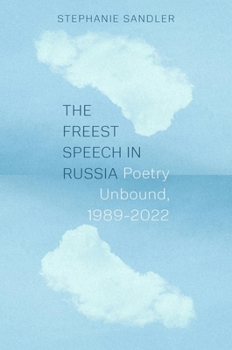The Freest Speech in Russia: Poetry Unbound, 1989-2022
The first English-language study of contemporary Russian poetry and its embrace of freedom--formally, thematically, and spiritually
Since 1989 and the fall of the Berlin Wall, Russian poetry has exuded a powerful awareness of freedom, both aesthetic and political. No longer confined to the cultural underground, poets reacted with immediacy to events in the world. In The Freest Speech in Russia, Stephanie Sandler offers the first English-language study of contemporary Russian poetry, showing how these poems both express and exemplify freedom. This period was a time of great poetic flourishing for Russian poets, whether they remained in Russia or lived elsewhere. Sandler examines the work of dozens of poets--including Gennady Aygi, Joseph Brodsky, Grigory Dashevsky, Arkady Dragomoshchenko, Mikhail Eremin, Elena Fanailova, Anna Glazova, Elizaveta Mnatsakanova, Olga Sedakova, Elena Shvarts, and Maria Stepanova--analyzing their engagement with politics, performance, music, photography, and religious thought, and with poetic forms small and large. Each chapter investigates one of these topics, with extensive quotation from the poetry, including translations of all texts into English. In an afterword, Sandler considers poets' responses to Russia's war on Ukraine and the clampdown on free expression. Many have left Russia, but their work persists, and they remain vocal opponents of domestic political oppression and international violence.Format:Paperback
Language:English
ISBN:0691169969
ISBN13:9780691169965
Release Date:November 2024
Publisher:Princeton University Press
Length:440 Pages
Weight:1.48 lbs.
Dimensions:1.0" x 6.1" x 9.2"
Customer Reviews
0 rating





